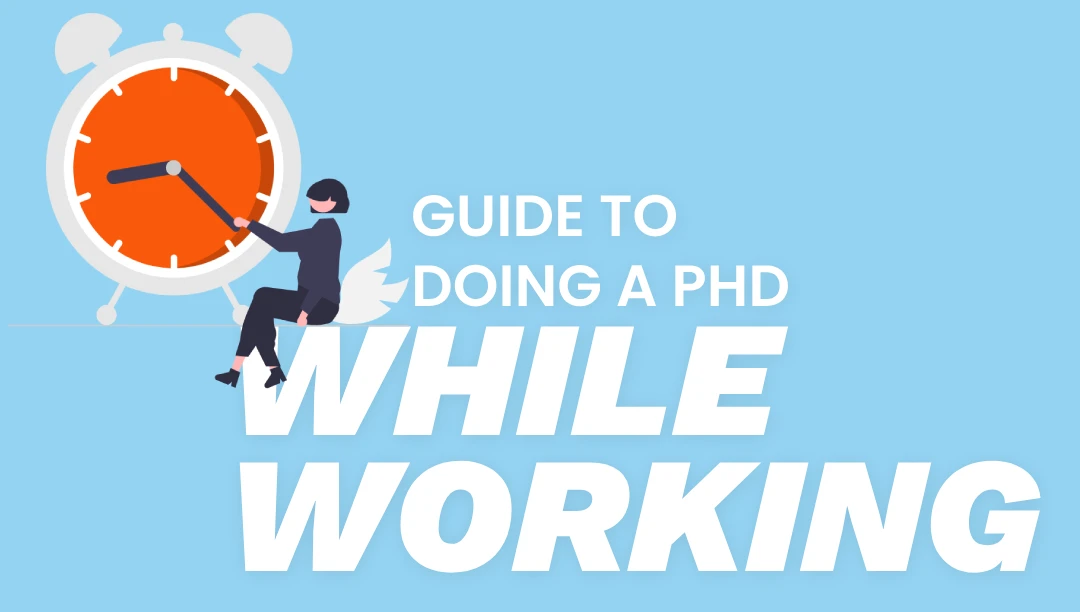Blog • Posted on Jul 08, 2025
How to Do a PhD While Working: A Practical Guide to Survive and Thrive
Doing a PhD While Working: Is It Even Possible?
Juggling a PhD and a full-time (or even part-time) job can feel like trying to run two marathons at once. You're constantly out of breath, short on time, and often wondering if it’s even worth it.
Here's the truth: doing a PhD while working is hard, but it’s entirely possible—if you set the right systems in place.
This guide will show you how to make it work, reduce overwhelm, and make meaningful progress on your PhD—even with a full plate.
Key Takeaways
- You don’t need superhuman discipline. Just smart systems. The secret to managing a PhD while working isn’t willpower. It’s blocking time, setting micro-goals, and reviewing your plan weekly.
- Protect 2–3 non-negotiable research blocks each week. These should be treated like meetings you can’t skip. Just a few focused hours can drive consistent progress.
- Perfectionism is your enemy. Momentum is your ally. A rough draft or half-done task still moves you forward. Aim for progress, not perfection.
- Use your energy, not just your time, wisely. Schedule deep thinking for when you're most alert. Save admin tasks for low-energy periods.
- The right tools can save hours each week. Apps like Notion, Zotero, and Pomofocus streamline your workflow and help you stay focused.
Table of Contents
Is It a Good Idea to Do a PhD While Working?
It depends on your goals, support network, and mental bandwidth. But for many people—especially those who are:
- switching fields,
- building credibility for a new career path,
- already employed in a research or policy role,
...a part-time or flexible PhD makes strategic sense.
Read our take on whether a part-time PhD is worth it here
For example, being a qualified PhD may elevate you to a higher pay bracket at your job, as is the case in Germany.
That said, you need to approach it differently than a full-time student. You don’t have the luxury of unstructured days. You need ruthless prioritization, clarity, and consistency.
Common Struggles and Why Most People Burn Out
Doing a PhD while working a job isn't just complicated, it's also exhausting. Mentally. Physically. Spiritually.
Without the right systems, you risk hitting your limit and burning out.
Here are the 5 most common reasons people give up on their PhDs while working:
-
No dedicated time for research
They try to squeeze it in after work or on weekends—which leads to burnout fast. Read our guide to writing papers when you're working a job. -
Unclear goals
They work hard but not smart—focusing on what’s urgent, not what’s important. -
Perfectionism
They want everything to be flawless. As a result, nothing gets finished. -
Lack of feedback
They work in isolation, unsure if they're even on the right track. -
Poor energy management
They underestimate the mental toll of context switching between job and research.
The Core Strategy: Systems, Not Willpower
You can’t muscle your way through a working PhD by grinding harder. The key is setting up simple systems that:
- reduce decision fatigue,
- protect your time,
- help you track progress,
- and allow you to bounce back when you fall off.
1. Blocked, Non-Negotiable Research Time
Pick 2-3 research blocks per week that are immovable—just like meetings or work shifts. Make them sacred.
Example: Tuesday and Thursday mornings from 7–9 AM before work.
Struggling to write? Get 30 days of writing advice straight from me to your inbox, for free!
2. A “One Next Thing” List
Always know the next small task to move your research forward. Don't write "Work on Chapter 2." Instead, write "Summarize Smith et al. (2020) for literature review."
3. Friday Review & Planning Session
Every Friday (or Sunday), ask:
- What did I get done this week?
- What’s the next high-priority task?
- Where will I fit that in next week?
Weekly Planning Framework for Working PhDs
Step 1: Time Audit (First Week Only)
Track
your time for 7 days. See where your hours are going. Most people
are shocked.
Step 2: Identify “PhD Windows”
Where can you
reliably block 5–10 hours/week? Common windows:
- Early mornings
- Lunch breaks
- Saturday mornings
Step 3: Pre-Schedule Work Blocks
Put these
in your calendar at the same time every week. Protect
them.
Step 4: Predefine Your Goals
Use the SMART
framework:
- Specific: Work through guide to writing a research introduction
- Measurable: 3 papers summarized
- Achievable: Based on available hours
- Relevant: Moves thesis forward
- Time-bound: Due by Sunday night
Step 5: Batch Admin Tasks
Emails,
formatting for journal submission, references—do them all at once, during low-energy periods.

We Help Working PhDs Finish Faster & Publish More Through:
- 1-On-1 Mentoring - Real people. Real results.
- Professional Editing - Our team of expert editors will get your manuscript publication-ready.
- Online Courses - Learn invaluable presenting & writing skills.
Time-Saving PhD Tools
Here are 5 tools that make it easier to do a PhD while working:
- Notion or Trello – Project management tools to track goals, progress, and references.
- Zotero or Mendeley – Reference managers that save hours on citation formatting.
- Speech-to-Text Apps Like Otter.ai – Dictate rough drafts while commuting or walking.
- Pomofocus.io – Helps you focus in 25-minute sprints.
- Google Calendar – Schedule your non-negotiable research blocks.
How to Prioritize When Everything Feels Important
When you're short on time, doing the right work matters more than doing more work.
Step 1: List Everything on Your Plate
Brain
dump all current tasks.
Step 2: Categorize Each Task
| Task | Urgent? | Important? |
|---|---|---|
| Finish data analysis | Yes | Yes |
| Reformat references | No | Yes |
| Check new journal calls | Yes | No |
| Watch webinar replay | No | No |
Step 3: Focus on Important, Non-Urgent Tasks
These are your long-term success drivers.
Step 4: Schedule Them First
Don’t do
low-value admin work just because it’s easy. Block time for the
hard stuff first.
FAQs: Doing a PhD While Working
How many hours per week should I dedicate to my PhD if I’m working?
Aim for 10–15 focused hours per week. Quality matters more than quantity. Even 6–8 hours can be enough if they’re high quality.
Should I tell my employer I’m doing a PhD?
Depends on your situation. If your research aligns with your role, it can lead to support or flexibility. If not, keep it separate unless required.
How do I stay motivated over several years?
Break big goals into short sprints. Celebrate small wins. Revisit your reason for doing this regularly. Support groups or mentors can also help.
What should I do if I fall behind?
Don’t panic. Re-plan your week, trim non-essentials, and refocus on the next small win. Momentum beats guilt.
Is it better to do a part-time PhD or full-time while working?
Part-time is more sustainable. Full-time PhDs with jobs rarely work unless one is extremely flexible.
Conclusion: Progress > Perfection
No one doing a PhD while working is doing it perfectly. The goal is progress. A messy draft is better than none. A 30-minute work session is better than zero.
If you’ve committed to this path, you already have what it takes. Build your system. Protect your time. And above all—keep moving forward.
Deciding whether to work a job while doing your PhD? We covered the pros and cons of full-time vs part-time here.
Need help managing your PhD while working?
RURU offers mentoring specifically for working researchers. We help you set priorities, stay accountable, and make real progress—even with limited time.
Learn more about PhD mentoring here
Dr. Matt Biddick is a Mentor & Editor at RURU. Book a free 1:1 session with him here.


